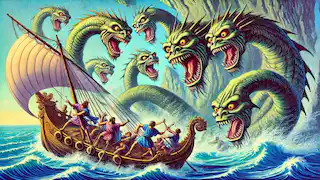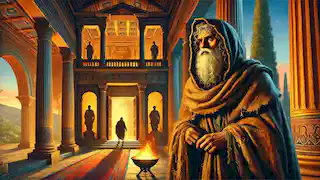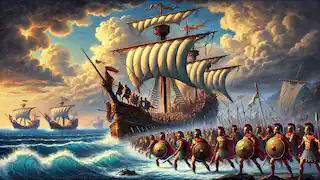The Departure
The winds howled across the Aegean Sea, filling the sails of Odysseus' ship as it departed from the shores of Troy. The warriors aboard were weary from a decade of battle, their faces lined with the hardships they had endured. Yet, the promise of home filled their hearts with hope and determination. Odysseus, their brave leader, stood at the prow, gazing into the horizon. His mind was filled with thoughts of Ithaca, his homeland, and Penelope, his faithful wife. Little did he know, the journey ahead would test his wits, strength, and resolve beyond imagination.
As the fleet sailed into the open sea, the gods watched from Mount Olympus. Poseidon, the god of the sea, was particularly attentive. He harbored a grudge against Odysseus for blinding his son, the Cyclops Polyphemus. Determined to make Odysseus' journey a torment, Poseidon unleashed a ferocious storm. The waves towered above the ships, crashing down with relentless fury. The men clung to the masts, praying for mercy, but their pleas were swallowed by the raging tempest.

The Lotus-Eaters
Days turned into weeks as the ships battled the elements. Finally, they sighted land and sought refuge on an unfamiliar island. Exhausted, the crew stumbled ashore, grateful for solid ground beneath their feet. Unbeknownst to them, they had arrived on the island of the Lotus-Eaters. The inhabitants offered them the lotus fruit, a seemingly harmless gift. However, those who consumed it were overcome by a blissful forgetfulness, abandoning all thoughts of home.
Odysseus, suspicious of the fruit, refrained from eating it. Realizing the danger, he forcefully dragged his men back to the ships, ignoring their pleas to stay. With great difficulty, he managed to break the enchantment's hold, and they set sail once more, their resolve renewed.
The Cyclops
The next challenge awaited them in the land of the Cyclopes. Desperate for provisions, Odysseus and his men ventured into a cave filled with sheep and cheese. Their curiosity soon turned to terror as the cave's owner, the giant Cyclops Polyphemus, returned. Trapped inside, they watched in horror as Polyphemus devoured two of their comrades.
Odysseus, ever cunning, devised a plan. Offering Polyphemus wine, he introduced himself as "Nobody." As the Cyclops fell into a drunken stupor, Odysseus and his men sharpened a wooden stake. They plunged it into Polyphemus' single eye, blinding him. In agony, Polyphemus roared, but when his fellow Cyclopes came to his aid, he could only say that "Nobody" was attacking him. Odysseus and his men escaped by clinging to the undersides of the sheep as they were let out to graze, securing their freedom through wit and bravery.
Circe's Island
After several arduous days at sea, the crew found solace on the island of Aeaea, home to the enchantress Circe. Initially hostile, Circe transformed some of the men into pigs. Odysseus, with the help of the god Hermes, who provided him with a magical herb, confronted Circe and demanded his men be restored. Impressed by his courage, Circe complied and welcomed them warmly. They stayed for a year, feasting and regaining their strength, but the call of Ithaca grew too strong to ignore.
Before their departure, Circe revealed the path they must take. She warned of the dangers ahead, including the journey to the Underworld to seek the prophecy of the blind seer Tiresias. With heavy hearts but renewed determination, they sailed onward.
The Underworld
Odysseus and his crew ventured into the dark realm of the dead, guided by Circe's instructions. They reached the land of the Cimmerians, where the entrance to the Underworld lay. Odysseus performed the necessary rituals, and the spirits of the dead began to appear. Among them was Tiresias, who foretold the trials still to come. He warned Odysseus of Poseidon's wrath and the dangers of the journey ahead, including the temptation of the Sirens, the perils of Scylla and Charybdis, and the consequences of angering the Sun God Helios.
Armed with this knowledge, Odysseus resolved to face the challenges ahead with unwavering resolve. He also encountered the spirits of his mother and fallen comrades, who imparted wisdom and urged him to return home.
The Sirens
Sailing onward, the crew approached the island of the Sirens, whose enchanting songs lured sailors to their doom. Following Circe's advice, Odysseus had his men plug their ears with beeswax and ordered them to bind him to the mast. As they neared the island, the Sirens' voices filled the air, promising knowledge and delight. Odysseus, unable to resist, struggled against his bonds, but his loyal crew kept him secure until they were safely past the danger.
Scylla and Charybdis
The next trial was the narrow strait guarded by the monstrous Scylla and the whirlpool Charybdis. With no other choice, Odysseus steered the ship closer to Scylla, sacrificing six men to her ravenous jaws but avoiding the deadly whirlpool. The loss weighed heavily on the crew, but they pressed on, driven by the hope of returning home.

The Cattle of the Sun
They soon arrived at the island of Thrinacia, home to the sacred cattle of the Sun God Helios. Despite Odysseus' warnings, the crew, driven by hunger, slaughtered some of the cattle while Odysseus was away. Enraged, Helios demanded retribution from Zeus, who sent a storm that destroyed their ship. Only Odysseus survived, clinging to a piece of the wreckage as he drifted towards the island of Ogygia.
Calypso's Island
On Ogygia, Odysseus was taken in by the nymph Calypso, who fell in love with him and kept him captive for seven years. Despite the comfort and immortality she offered, Odysseus longed for Ithaca and Penelope. Finally, the gods intervened. Hermes was sent by Zeus to order Calypso to release Odysseus. Reluctantly, she complied, helping him build a raft to continue his journey.

The Phaeacians
After enduring more hardships at sea, Odysseus washed ashore on the island of the Phaeacians. He was discovered by Nausicaa, the daughter of King Alcinous, who took him to her father. Welcomed with hospitality, Odysseus recounted his adventures. Moved by his tale, the Phaeacians agreed to help him return to Ithaca. They provided him with a ship and crew, and Odysseus finally set sail for his homeland.
Return to Ithaca
Upon reaching Ithaca, Odysseus disguised himself as a beggar to assess the situation at home. He found his palace overrun with suitors vying for Penelope's hand. With the help of his son Telemachus and a few loyal servants, Odysseus devised a plan to reclaim his throne. In a dramatic confrontation, he revealed his identity and, together with Telemachus, vanquished the suitors.
Reunited with Penelope at last, Odysseus' long and arduous journey came to an end. Peace was restored to Ithaca, and the hero who had faced gods and monsters could finally rest.
The Final Rest
With his kingdom restored and his family reunited, Odysseus ruled Ithaca with wisdom and justice. The trials he endured had not only tested his strength and cunning but had also deepened his appreciation for the simple joys of home. Though he had been offered immortality and the company of divine beings, Odysseus found his greatest fulfillment in the love of his wife and the loyalty of his people.
As he grew older, the memories of his journey remained vivid, a testament to his resilience and ingenuity. He often shared tales of his adventures with his grandchildren, ensuring that the legacy of his odyssey would live on. Odysseus' story became a source of inspiration, a reminder that the greatest challenges could be overcome with determination, wisdom, and an unyielding spirit.



















